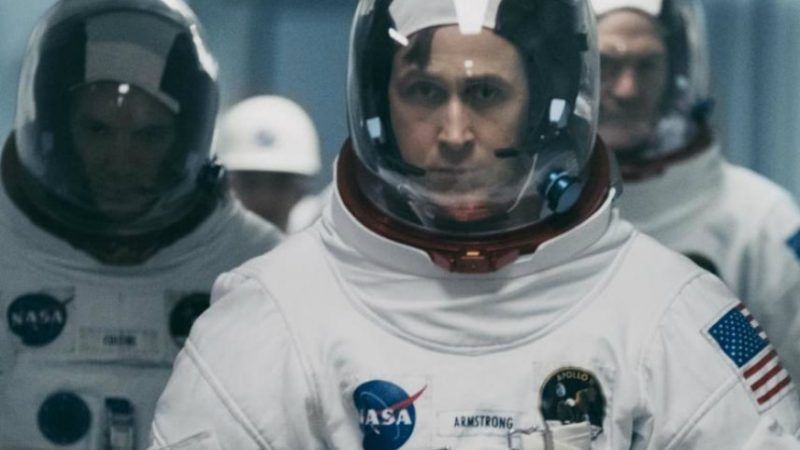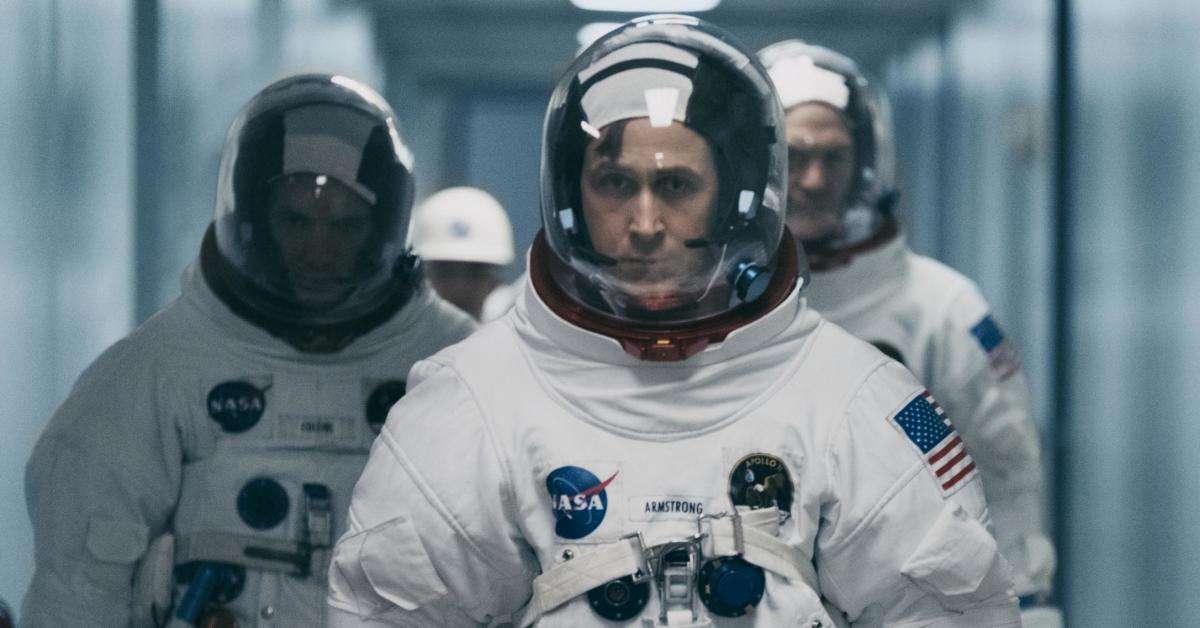First Man Is an Intimate, Epic Movie About Death, Risk, Ambition, and Space Exploration
It's a reminder that space exploration is anything but safe.


History likes to remember the moonshot in mystical terms, as a matter of national will and individual courage, a triumph of the human spirit and American character. It was all of those things—or at least it has become them in retrospect. But many of those involved with the project at the time viewed it on more practical terms, as a complex engineering challenge: How do you lift human beings out of Earth's gravity well, land them on a big rock orbiting the planet 240,000 miles away, and then return them safely?
The answer, it turned out, was to strap a tin can to a rocket, blow it up, connect with a yet another tin can already orbiting in space—and hope everything works out. Which it very well might not.
No one knew this better than Neil Armstrong, the first human to set foot on the surface of the moon, and the subject of Damien Chazelle's intimate, majestic new film, First Man. The movie is a deeply moving, painstakingly detailed, and altogether wondrous reminder that the first voyage to the moon was a feat of brilliant but essentially low-tech engineering where the downside outcome was certain death.
Chazelle captures Armstrong's journey and the years leading up to it with a rough and remarkable physicality, from the sound design, which emphasizes the groaning, rickety construction of early space vessels, to the claustrophobic close-ups and perspective shots that, more than any film I've ever seen, offer a tactile sense of what it was like to be stuffed into a tiny cockpit, spinning out of control, surrounded by inscrutable analog dials, desperately trying to coax an unwilling machine into going where you want while keeping you alive.
The film creates this sensation partly through a series of bravura flight sequences, all of which are shot primarily from the pilot's perspective, and partly through the accumulation of small details—a fly on a flight panel just before takeoff, a mission-tech calling for a Swiss army knife to "fix" a malfunctioning cockpit component minutes before blastoff. First Man never lets you forget that humans traveled to space in objects—objects that were constructed by other humans, sometimes imperfectly. Even when they worked, they offered little more than a thin barrier between the humans inside and the cold abyss beyond.
Chazelle, for his part, treats the film as a kind of cinematic engineering challenge: He shot the film with no green screen and minimal computer generated imagery; some of the rocket launch sequences use historical footage; the bulk of the movie was shot on 16mm film, giving it a period-appropriate grit, texture, and intimacy; the finale was shot in IMAX 70mm, which gives the moon landing a vast and mysterious grandeur, allowing the film, in some of its best moments, to dwell on the black and empty depths of outer space. (In this he follows closely in the footsteps of director Christopher Nolan, whose insistence on practical effects work and large-format photography has helped spark a backlash against filmmaking that relies too heavily on computer-generated imagery.)
The result is a film that offers such a tangible, material sense of all the stuff humans built and used for the moon landing that it almost seems to have physical weight. It's a audio-visual experience, but I remember it almost like something I could reach out and touch.
Yet for all its hard-headed realism, its emphasis on the machinery of spaceflight, First Man is not an unfeeling or inhuman film. Quite the opposite.

Much of the credit for the movie's emotional intelligence goes to Ryan Gosling, who plays Armstrong as with an unshowy reserve that masks a deep well of feeling. After a breathtaking opening flight test, the film shows the death of Armstrong's young daughter, a moment of tragic loss that haunts the rest of the film. It is not the only death portrayed in the film, but it is the most important, the one that grounds every moment to come in the pain of a tragic personal loss.
Chazelle, working from a screenplay by Josh Singer, captures the character not only of Armstrong, but of the entire enterprise—stoic, compartmentalized, determined to the point of obsession, and highly tolerant of the risk of death, which often means not acknowledging the possibility. Among the movie's most quietly powerful scenes is the moment when, just before the moon mission is launched, Armstrong's wife Janet (Claire Foy) forces him to sit down and explain to his children that he might not return, a task he can only manage with detachment. Chazelle has dealt with the inner lives of driven young men before, in Whiplash and La La Land, but First Man is his most mature examination of the male psyche. It's an acute portrait of the ways in which death-taunting ambition becomes an emotional exhaust valve for psychological trauma.
The movie's obsession with death, risk, ambition, and historical achievement also seems designed to raise questions about the existence of such projects in our own time. In contrast to the Apollo missions, modern space programs typically have reduced tolerance for risk, and, consequently, have tended to proceed at a far slower pace, with less grandiose goals and results. They are somewhat safer, yes, but also smaller in scope and scale, and less likely to inspire—or to arrive anywhere worth going.
Although First Man gives a sympathetic hearing to protesters (and, to a lesser extent, legislators) who thought the moonshot was a waste of American lives and taxpayer money, it comes down firmly on the side of its spacefaring subjects: Traveling to the moon, the movie seems to say, was worth it precisely because it was such an ambitious, difficult, and, yes, risky undertaking.
It is perhaps no accident that the most exciting and inspiring space efforts today are in the private sector, from Elon Musk's fanciful visions of colonizing Mars to the commercial space race, which, thanks to the mad ambitions of a handful of billionaires, is closer than ever to taking paying passengers beyond gravity's grip. In a gripping New Yorker feature earlier this year, Nicholas Schmindle made clear that those projects, too, have been strained by death, by difficult personalities, by losses of confidence, and by an assortment of profound engineering conundrums. And they have been fueled by individual determination and men with huge appetites for risk. These are the virtues that First Man celebrates and embodies; they once took us to the moon, and someday, I hope, they will take us beyond.
Editor's Note: As of February 29, 2024, commenting privileges on reason.com posts are limited to Reason Plus subscribers. Past commenters are grandfathered in for a temporary period. Subscribe here to preserve your ability to comment. Your Reason Plus subscription also gives you an ad-free version of reason.com, along with full access to the digital edition and archives of Reason magazine. We request that comments be civil and on-topic. We do not moderate or assume any responsibility for comments, which are owned by the readers who post them. Comments do not represent the views of reason.com or Reason Foundation. We reserve the right to delete any comment and ban commenters for any reason at any time. Comments may only be edited within 5 minutes of posting. Report abuses.
Please to post comments


I currently work on the Orion program, and when I hear that the official goal is one flight a year, two years from now, all I feel is embarrassment.
So what's the feeling within the program about what Boeing and SpaceX are doing? Professional camaraderie or a feeling of being overtaken?
Pikes or halberds?
It takes an entire Swiss army to fix some problems.
Zweihander swords or GTFO!
All of this is pretty romantic, given the brutal realities of space travel. It's not like Columbus sailing the ocean blue. No living thing, not even the simplest, has ever been found outside our remarkable cocoon, which is in fact far more remarkable than we can begin to imagine. Let Elon Musk go to Mars. When he makes it, I'll applaud. But not until then.
"No living thing, not even the simplest, has ever been found outside our remarkable cocoon, which is in fact far more remarkable than we can begin to imagine."
All the more reason to spread out through the solar system, and then the galaxy. There are finite resources on Earth, and many more beyond. Numbering in the trillions on multiple planets is the only way to ensure the survival of the species in the face of global catastrophe.
Living in space (as opposed to surviving in space, the status quo) is just an engineering problem. Unfortunately, as long as humans need an explosive rocket to get off the planet, the government will make it very difficult and expensive to do so, retarding progress to almost nothing.
Too bad they apparently retconned Old Glory out of the moon's history, so I won't be going to see this, thank you very much. I mean, who didn't want to see how they made the stars and stripes fly without any wind? That's the signature technological achievement of the whole endeavor.
They didn't. There are lots of images of Old Glory in the movie - including the one left on the moon.
No spoilers, please.
The moon landing was faked, but, to make it seem authentic, they had to fly to the moon in order to fake it.
Uhm, no, the other tin can was not already orbiting in space. The Apollo missions were accomplished with a single launch. The LEM was carried underneath the Command Module and Service Module, and once they achieved orbit they would undock, rotate the CM/ SM 180 degrees and then dock with the LEM. I'm really hoping this was a fuck up on Suderman's part and not something that the movie got wrong. Fucking up a fundamental detail like that would be inexcusable.
Thanks for pointing this out. As someone who read every detail about this (and built plastic models of most of the spacecraft involved) I also caught that. Pedants gotta pedant. 🙂
It is in reference to the Gemini practice docking mission. Now iron your panties.
I can't see the entire flag on Armstrong's shoulder in that scene. Boycotting the movie.
I'll go see this movie, because it looks entertaining and well made.
I'll also go see it because it seems to piss off "both sides". The right because of the flag, and to a lesser extent the left because there aren't enough women featured in prominent roles. Boycotts always make me want to spend money.
Since Reason's movie reviews usually focus only on the big releases, I'm here to recommend a movie I saw last night.
The Bookshop is set in a quaint English seaside town in the 1950s and follows the story of a long-widowed woman who opens the town's first bookshop despite objections from the ruling gentry who want to use the premises for a publicly-funded arts center. How can art have a center? objects a critic.
Seemed like a gentle period piece that the Brits excel at until the story of opposition from the local nobs developed into what I can only describe as an entrepreneur-versus-bureaucracy gem. Performances are fantastic, especially from two young actors who don't let their precociousness ever become sickening.
The trailer gives a good impression but fails to convey the quite serious themes of the individual, the romantic, against a conformist community happy to use the law punish the innovator.
Adult themes without the sex and violence. The juxtaposition of setting, themes and style are very refreshing.